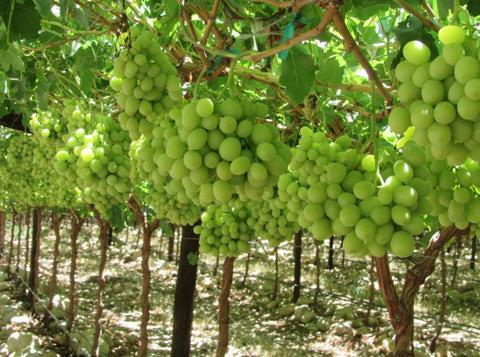The country’s table grape industry predicts that its season will end even earlier than last year
South African table grape growers are expected to finish their harvest earlier than last year, when the last grapes were packed in week 14.

Industry body Sati said that by week 6 the South African harvest had passed the three-quarter mark, with 78 per cent (59.5m cartons) of its estimated volumes packed, an increase of 18 per cent.
“The season is expected to end earlier than last year, which concluded in week 14,” it confirmed.
“An earlier finish to the season demonstrates the need for planning to be in place and to be well executed for the rest of the season,” Sati stated. “This is to ensure that commitments can be met, and that product is shipped to appropriate markets.”
Stability in the EU market, product quality, rain/weather patterns and exchange rates all stood to impact the overall season outcomes.
”Growers and exporters should remain abreast of market factors to make the most viable commercial decisions” said Nico Louw, head of marketing at Exsa, which contributed to Sati’s latest seasonal update.
Up to week 6, 46.6m cartons had been exported, which represented a 19 per cent increase on the same time last year.
The industry had continued to utilise divergent logistics strategies for exports, Sati explained.
“Although not ideal due to the increased cost, a further 1.8m cartons were diverted from Cape Town to Port Elizabeth for export in week 6, bringing the total volume of grapes exported through this port to 4.7m cartons for the season, accounting for 10 per cent of all exports to date.”
Conventional reefer vessels also carried approximately 1m cartons of grapes in week 6, which brought exports by conventional vessels to 10 per cent of the season’s total to date.
Louw said that rain and hail experienced in certain areas of the Hex River Valley had impacted the quality and the transit ability of certain cultivars.
“This presented an opportunity to pack increased volumes of Autumn Crisp and Sweet Globe to some markets,” he outlined.
“Logistics delays continue to pose a challenge. Alternatives are recommended, such as utilising conventional vessels and alternate port options.”
To date, sales have been favourable in Europe. “Due to the Red Sea crisis, it was expected that India would ship lower volumes to the European Union. However, volumes seem to have increased this year.”
The UK remained one of the steadiest markets for South Africa grapes, said Louw.
“It is advisable to keep quality at the top of mind and not to store product for extended periods before shipping,” he said. ”Prices to date have been in line with expectations, and stock volumes are beginning to stabilise.”
On the other hand, logistical delays have had a significant impact on grapes reaching the US and Canada.
“This has made planning programmes to these markets challenging,” he added. “Late red South African varieties have done well in these markets this season, despite competing with Chilean varieties.”



